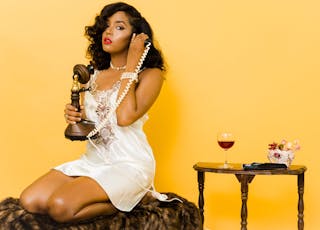Queer women face unique challenges in the dating world, but one thing that remains universal is the need to be aware of red flags when starting a new relationship. Whether you're dating online or meeting someone in person, it's important to be mindful of potential warning signs that could indicate a problematic partner. To shed some light on this topic, we spoke to 12 queer women about their biggest dating red flags. From communication issues to disrespect and dishonesty, here's what they had to say.
Are you tired of falling for the wrong women? It's time to take control of your dating life and watch out for these 12 red flags. From inconsistent communication to making you feel like an afterthought, these signs are important to look out for. Don't let yourself get caught up in a toxic relationship - learn how to spot these warning signs before it's too late. Check out this article for more insight on navigating the dating scene as a queer woman.
Communication Breakdowns:
If you're looking to improve your dating profile, check out this helpful guide on writing a compelling personal ad.
One of the most common red flags mentioned by our interviewees was a lack of communication. Whether it's being ghosted by a potential partner or noticing a pattern of one-sided conversations, queer women highlighted the importance of open and honest communication in a healthy relationship. "If someone consistently fails to respond to messages or calls, it's a major red flag for me," said Sarah, 29. "Communication is key, and if someone isn't making an effort to stay in touch, it's a sign that they may not be fully invested in the relationship."
Explore the swinger scene in Huddersfield and discover popular dating websites for an exciting new experience.
Disrespectful Behavior:
Explore the world of BDSM desires with this informative article
Another red flag that many queer women mentioned was disrespectful behavior. This could include anything from making derogatory comments about a partner's identity to being rude or dismissive in conversations. "If someone is disrespectful towards me or others, it's a huge red flag," said Maya, 25. "I want to be with someone who values and respects me for who I am, and if they can't do that, it's a clear sign that the relationship isn't going to work."
Dishonesty and Deception:
Several interviewees also expressed concerns about dishonesty and deception in relationships. This could manifest as lying about important details, hiding important aspects of one's life, or being generally untrustworthy. "I've been in relationships where my partner was dishonest about their intentions or actions, and it's a huge red flag for me now," said Taylor, 30. "Trust is the foundation of any relationship, and if that's compromised, it's hard to move forward."
Incompatibility and Unwillingness to Compromise:
In addition to the aforementioned red flags, many queer women also highlighted the importance of recognizing incompatibility and an unwillingness to compromise. This could include differences in values, interests, or lifestyle choices that create tension in the relationship. "If someone is unwilling to compromise or make an effort to understand my perspective, it's a red flag for me," said Jamie, 27. "A healthy relationship requires mutual respect and understanding, and if that's lacking, it's a warning sign."
Lack of Empathy and Emotional Support:
Lastly, many queer women emphasized the importance of empathy and emotional support in a relationship. This could include a partner's inability to understand or validate their feelings, or a lack of emotional availability. "I've been in relationships where my partner couldn't empathize with my experiences, and it was a major red flag," said Alex, 31. "A healthy relationship should be a safe space for both partners to express themselves and receive emotional support."
Ultimately, dating as a queer woman comes with its own set of challenges, but being aware of potential red flags can help you navigate the dating world more confidently. By paying attention to communication patterns, behavior, honesty, compatibility, and emotional support, you can make more informed decisions about the partners you choose to invest in. Remember, your happiness and well-being should always be a priority in any relationship.
- https://dating-guide.campsupernow.com/posts/anal-sex-tips-how-to-prepare-for-anal-sex/
- https://meet-women.getweps.com/posts/why-twitter-is-being-accused-of-deliberate-bisexual-erasure/
- https://flirting-online.thehottieandthenottie.com/posts/what-your-sex-life-would-look-like-in-a-spotify-yearly-wrap-up/
- https://singles-chat.timebombrecordings.com/posts/how-to-make-missionary-sex-better-according-to-13-guys/
- https://online-personals.getweps.com/posts/woman-on-top-how-to-ride-dick-sex-position-tips/
- https://online-sex.timebombrecordings.com/posts/how-sex-can-feel-different-throughout-your-menstrual-cycle/
- https://meet-women.getweps.com/posts/how-to-lick-a-girl-out-how-to-eat-a-girl-out-oral-sex-tips/
- https://location-dating.getweps.com/posts/bath-sex-bathroom-sex-tips/
- https://dating-app.getweps.com/posts/polyamory-diaries-11-i-love-my-wife-and-my-girlfriend/
- https://find-a-girlfriend.campsupernow.com/posts/best-sex-positions-41-of-the-best-sex-positions/
- https://singles.ua-sex.com/posts/my-best-sex-ever-was-with-a-bollywood-star/
- https://online-hookup.thehottieandthenottie.com/posts/best-genderaffirming-sex-toys/
- https://chatting.campsupernow.com/posts/karma-sutra-sex-positions-sensual-spoon/
- https://free-dating-website.themountaintopplay.com/posts/fleabagging-what-is-the-fleabagging-dating-trend/
